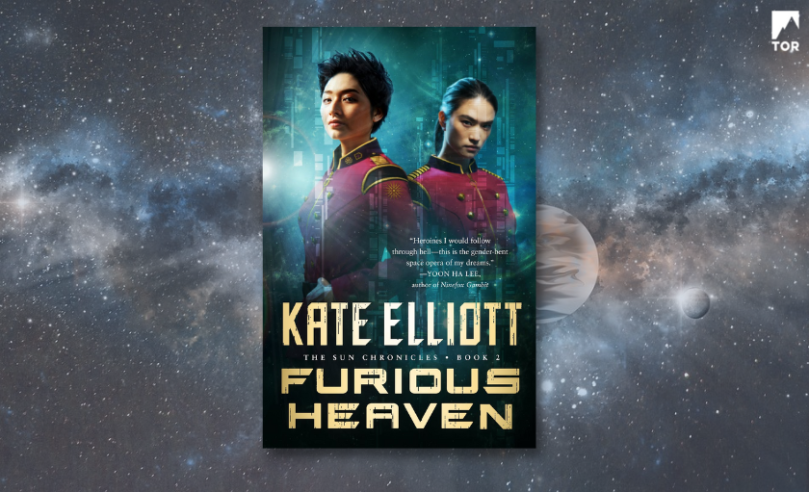 We love space operas. LOVE. But we have questions.
We love space operas. LOVE. But we have questions.
Like how does one even afford a death star? How does faster than light travel affect supply and demand!?
Yeah fine, we get it. We’re nerds. But Kate Elliott joined us anyway, to talk about using ancient history to perfect the far future world of her epic space opera Unconquerable Sun and its follow-up, Furious Heaven.
By Kate Elliott
Much ink and countless hours of talk have been spilled on the question of which elements of social and physical landscape are critical to developing a consistent, believable secondary world.
Unconquerable Sun is a space opera spun from the premise of a gender swapped Alexander the Great (in space). It’s remarkable how useful teasing out aspects of life and society in the ancient world has been when it comes to creating an economic landscape for this far far future setting. Economics is a big topic, and in its largest theoretical sense can seem daunting. I chose to focus on three aspects: a top-down state economy, agriculture, and logistics.
Ancient Macedonia’s primary sources of wealth came from revenues raised through its forest and mineral resources. The king largely controlled timber and mineral wealth while, especially in the lowlands, aristocratic families partitioned out pasturage for horses and cattle as well as farmland. Wealth from the latter would be returned to royal coffers via taxes and gifts. King Philip’s treasury financed the training and outfitting of a powerful modern (in its time) army as well as his multiple campaigns.
But war is expensive. Fleets and military campaigns can also be paid for in part by what is looted or strong-armed from conquered lands. Both Philip and his son Alexander were always on the hunt for more revenue, more resources. Accounts of Alexander’s campaign frequently mention the staggering wealth of the Persian Empire which fell into the hands of Alexander to be distributed in part to his generals and his army. Later, what remained of this wealth was fought over and disbursed between the generals who, having survived him, battled among themselves for control of his empire. To the victor, the spoils.
As my story opens, the Republic of Chaonia has been on a war footing for over twenty years. I kept this state-controlled model of a war economy in mind as I wrote.
Because I grew up in rural Oregon farm country, my early world building thoughts inevitably stray to what food will be available in the world or worlds I’m writing about. What do people eat? What else do they grow for other purposes like feed, textiles, fragrances, cosmetics, fuel, pharmaceuticals, ecological health, and ecological mitigation?
What does agriculture have to do with the economy of space opera?
A common (although not required) element of space opera is a story set within a rich network of star systems. Even with a speedy means of interstellar travel, these are exceptional distances that can’t be conceived of as a mere one hour plane hop or car drive away.
Again, the ancient world proved useful as a means of conceptualizing distance as a measure both of time and space. In those days it could take weeks or months or even years to travel from one place to another on foot, mounted, or by wagon. The Persian Empire built a Royal Road that stretched from one of its capitals, at Susa, to the city of Sardis in what is now Turkey. This road made swifter communications possible, helped armies move more expeditiously, and benefited trade as well as tax collection.
It turns out that agriculture provides a perfect foundation on which to think about how an extended and extensive futuristic trade economy might work. What crops and vegetation are available and why? Where and how are these grown? Are they consumed locally only? If they are moved to a nearby city or across a continent or to another planet in the same star system, then who is moving these goods at what cost and for what destination? What about the economics of interplanetary trade? What other resources are valuable on and off planet? Is there anything worth trading on an interstellar level? How does a space merchant make a living, given the distances and expenses involved? The existence of merchants and the means by which they get from place to place exists in the deep background of the tale.
Agriculture rolls into the final element of this economic trifecta according to a saying attributed variously to Napoleon or Frederick the Great: An army marches on its stomach.
“Supply is the basis of strategy and tactics,” as Donald W. Engels wrote in his classic study Alexander the Great and the Logistics of the Macedonian Army (University of California Press, 1978). The enemies of Chaonia think about supplies and resources, and make decisions based on what they know of Chaonia’s fleet disposition and resource management. Queen-Marshal Eirene and her daughter, Princess Sun, and their marshals, go through similar calculations. As the character Hestia Hope says in Unconquerable Sun, “Logistics win campaigns.”
Politics and war can’t exist without the means and method to wage it. A story like Alexander’s erupts in large part because of the particular circumstances of his time and his background and his unique placement in the world at that moment. Part of my goal in the series has been to capture something of that unique moment. I’ve used pieces of the ancient world as building blocks, threads reaching across a great distance into an imagined far future setting.
Kate Elliott’s gender spun Alexander the Great in space is out now. Elliott been writing science fiction and fantasy for 30 years, after bursting onto the scene with Jaran. She is best known for her Crown of Stars epic fantasy series and the New York Times bestselling YA fantasy series Court of Fives. Elliott’s particular focus is immersive world building & centering women in epic stories of adventure, amid transformative cultural change. She lives in Hawaii, where she paddles outrigger canoes & spoils her schnauzer.
Thanks to Dr. Jeanne Reames for her help in writing this post.
Order Unconquerable Sun in Paperback Here
Order Furious Heaven Here:











